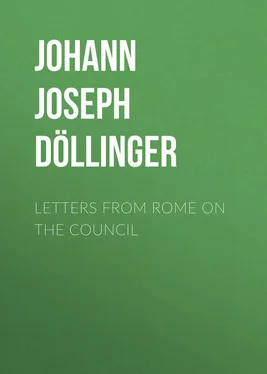Johann Döllinger - Letters From Rome on the Council
Здесь есть возможность читать онлайн «Johann Döllinger - Letters From Rome on the Council» — ознакомительный отрывок электронной книги совершенно бесплатно, а после прочтения отрывка купить полную версию. В некоторых случаях можно слушать аудио, скачать через торрент в формате fb2 и присутствует краткое содержание. Жанр: foreign_antique, foreign_prose, на английском языке. Описание произведения, (предисловие) а так же отзывы посетителей доступны на портале библиотеки ЛибКат.
- Название:Letters From Rome on the Council
- Автор:
- Жанр:
- Год:неизвестен
- ISBN:нет данных
- Рейтинг книги:3 / 5. Голосов: 1
-
Избранное:Добавить в избранное
- Отзывы:
-
Ваша оценка:
- 60
- 1
- 2
- 3
- 4
- 5
Letters From Rome on the Council: краткое содержание, описание и аннотация
Предлагаем к чтению аннотацию, описание, краткое содержание или предисловие (зависит от того, что написал сам автор книги «Letters From Rome on the Council»). Если вы не нашли необходимую информацию о книге — напишите в комментариях, мы постараемся отыскать её.
Letters From Rome on the Council — читать онлайн ознакомительный отрывок
Ниже представлен текст книги, разбитый по страницам. Система сохранения места последней прочитанной страницы, позволяет с удобством читать онлайн бесплатно книгу «Letters From Rome on the Council», без необходимости каждый раз заново искать на чём Вы остановились. Поставьте закладку, и сможете в любой момент перейти на страницу, на которой закончили чтение.
Интервал:
Закладка:
In a combined meeting of German and Hungarian Bishops, it was resolved, on Haynald's motion, to request of the Pope a better representation, and one more accordant with the dignity of the two Churches, on the Commissions. It was hoped that a majority of the French and a considerable number of the North American and Oriental Bishops, and even some Spanish and Italian Prelates, would join in this step. For Haynald's object was to propose that the whole assembly should be divided into eight national groups, and that each of these “eight nations” should be entitled to have two or three members, elected from its own body, – some sixteen or twenty-four in all – added to the four elected Commissions, and to the Commission nominated by the Pope for examining all motions proposed. This, it was thought, would secure a counterpoise to the skilfully disciplined majority which was crushing out all opposition. For it has already become evident that the strength of the Romanist party lies in the number of titular Bishops selected by the Pope, and Vicars-Apostolic or missionary Bishops; in persons, that is, who, having no flocks, or only having them in expectation, represent in fact nothing and nobody, and can therefore bear no testimony to the faith of their Churches, which have no existence. The Germans were greatly elated by this project; they admired and congratulated themselves on having shown so much spirit, and daring to tell the Pope something widely different from the assurance that they were ready to die in absolute subjection to him. Hereupon Schwarzenberg came forward to declare that he would not sign the petition, as he did not choose to compromise himself further with the Pope, and Rauscher of Vienna, and Tarnóczy of Salzburg, sided with him. This caused great consternation, and at the first moment many thought it betokened an entire apostasy, and that in Schwarzenberg's case the Cardinal had triumphed over the German. But he has so emphatically denied this that he must be believed. It is very conceivable that Schwarzenberg, seeing more deeply into the situation at Rome, was led by grounds of expediency to take this course; possibly the mere wish to make as sparing use as they could of the fund of high spirit and courage brought from Germany, and the fear of using it up too quickly, in case the Council should last some time, may have determined the three Prelates to decline subscribing. Already a new demand has been made upon the Bishops, to adopt the Schema the Pope had intrusted the preparation of to the Jesuits.
The contest over this Schema has begun in good earnest, according to the impression made by the General Congregation held yesterday, Dec. 28. The first part of the Schema was the one the speakers dwelt on, – as far, that is, as they could be heard, for the acoustic uselessness of the hall makes itself felt before and behind, and the pulpit had to be carried about all round the room before the right position could be hit upon for it. Meanwhile it had transpired, who were the authors of the Schema which the Pope meant to promulgate, “with the approbation of the Council,” as a binding rule of faith. They were two German Jesuits, Schrader, and another, either Franzelin or Kleutgen. It is remembered how, a year ago, a great deal was made in the newspapers of distinguished German scholars having been summoned to Rome for the preliminary labours of the Council. If several of the names mentioned created surprise from their obscurity, it gave satisfaction to find among those invited men like Hefele and Haneberg. It is now clear that every work of real importance was intrusted to other hands, chiefly to the Jesuits, while Hefele was summoned to Rome to extract the ceremonial from the Acts of the Council of Trent, after which he was dismissed, and Haneberg was commissioned to prepare a report on Eastern monasteries. Schrader has become notorious as the advocate of the extremest Papal system by his book De Unitate Romanâ Commentarius , where he treats all episcopal authority as a mere emanation of the Papal. According to him, every article of the Syllabus is to be so understood that the contradictory statement contains the true doctrine. It was therefore with very good reason that he was chosen out to draw up the Schema , or, in other words, to fabricate a second strait-waistcoat for theology, after the Council had already been put into one in the regulations for the order of business.
The Schema has aroused manifold displeasure, even among allies of Schrader and his brethren, and men who, like them, are Infallibilists. What I hear said everywhere is that the whole thing is a poor and very superficial piece of patchwork, with more words than ideas, and, as the blind old Archbishop Tizzani said in the Congregation, is above all designed to stamp the opinions of the Jesuit school as dogmas, and to substitute a string of new obligatory articles of faith for the theologumena or doctrines of the theological schools hitherto left open to the judgment of individuals. For a Society, like that of Loyola's disciples, it is of supreme importance to possess in the multitude of new anathemas what will always supply abundant matter for accusations; it appertains to their “arcana dominationis” always to keep alive the fear of being charged with heresy. It makes other theologians dependent on the Order, and cramps their literary energies. And it must be borne in mind that there are no longer any powerful theological corporations which might meet the Jesuits on equal terms. Were the Schema to be adopted, very few professors of Old Testament Exegesis could escape the charge of heresy, so far is the inspiration of the scriptural books, even the deutero-canonical, extended here for the first time.
And thus it happened yesterday that there was no single speaker for the Schema , but all, beginning with Cardinal Rauscher, spoke against it; and Archbishop Conolly of Halifax said in so many words, “Censeo Schema cum honore esse sepeliendum.” This of course has only been the beginning of the discussion, and we are naturally in suspense as to how it will proceed. But so much is already gained, that a spirit of independence is roused among the Bishops. Much is said here about the desertion of certain Bishops from the ranks of the Opposition, and new names are mentioned every morning, often with the remark that So-and-so has let himself be caught with the bait of one of the fifteen vacant Hats. These Hats are held here to be capable of working miracles. There is thought to be no more effective means of working the conversion of a hardened anti-Infallibilist than a decoration of that kind, and, in truth, the number might not be great of those who would say with Darboy, “Je n'ai point de rhumer de cerveau, je n'ai pas besoin de chapeau.” As long as fifteen of these Hats are suspended in the air ready to descend on a willing head, so long, every Italian is convinced, there can be no lack of conversions. The example of the Synod of Constantinople in 859 is quoted, where the Bishops were induced to vote for the deposition of Synesius by promising each of them separately the Patriarchal throne. Yet of the majority of French, German, Hungarian, and American Bishops, no one who knows them would expect this weakness; and so on closer inspection these rumours come to nothing. Even Ketteler, who had been given up for lost on account of his intimate relations with the Jesuits, – he lives in the German College – shows himself firm, and the most important personage who as yet has deceived the expectations formed of him is Cardinal Bonnechose, Archbishop of Rouen. It is stated in German circles that fifteen Spanish Bishops are wavering, and show a disposition to join the Opposition. The apprehension that the other party, whose admirable organization and adroitness in manœuvring deserves the highest praise, will carry through Infallibility by a coup still survives, and only yesterday several Bishops entered the Council Hall in dread of being taken by surprise by the acclamation. Cardinal di Pietro says it is no longer possible to drop the affair; things have gone too far already.
Читать дальшеИнтервал:
Закладка:
Похожие книги на «Letters From Rome on the Council»
Представляем Вашему вниманию похожие книги на «Letters From Rome on the Council» списком для выбора. Мы отобрали схожую по названию и смыслу литературу в надежде предоставить читателям больше вариантов отыскать новые, интересные, ещё непрочитанные произведения.
Обсуждение, отзывы о книге «Letters From Rome on the Council» и просто собственные мнения читателей. Оставьте ваши комментарии, напишите, что Вы думаете о произведении, его смысле или главных героях. Укажите что конкретно понравилось, а что нет, и почему Вы так считаете.












